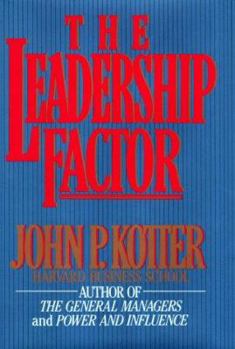The Leadership Factor
Because they are victims of short-term economic pressures and "parochial politics", most American companies critically lack the one factor proven effective in winning competitive advantage:... This description may be from another edition of this product.
Format:Hardcover
Language:English
ISBN:0029183316
ISBN13:9780029183311
Release Date:January 1988
Publisher:Free Press
Length:161 Pages
Weight:0.95 lbs.
Dimensions:0.7" x 6.4" x 9.6"
Related Subjects
Business Business & Investing Economics Leadership Management Management & LeadershipCustomer Reviews
3 ratings
Leadership... where can I buy it?
Published by Thriftbooks.com User , 16 years ago
I read this book some years ago when I just started my business and had no clue what leadership was. Many know the term, but very few actually practice it. And that's what this book is about, the scarcity of people with great leadership. Learn how to recognize it and learn from the people who show it. To get an idea, single out some very good leaders in sports. You can instantly single out some athletes, but then the list will stop as quickly as you started it. In business, it is even harder to get good leaders. Most business compete within the same league, but have no match-ups to get to know their talent. This will cause you to be restricted within your own organization for most of the time. This tremendous compelling book shows best practices from some of the largest companies and show their pain in the continuing pursuit of excellent leadership. This will make or break any organization in the long run.
Helped my career in a big way
Published by Thriftbooks.com User , 23 years ago
As a young, aggressive manager, this book helped me make breakthrough improvements for my (former) employer, Eastman Kodak Company. As a result I got promotions, raises, etc. It is only 161 pages, made its points consisely and convincingly, and I profited immensely.
Leadership to Expand the Flexibility of the Firm
Published by Thriftbooks.com User , 24 years ago
When this book was written, the winds of change for companies were just beginning to blow hard. Competition was getting tougher and coming from more places. Customers were becoming harder to please. Rapid changes in business environments created great dislocations. The enormous task of making enterprises more efficient was in its early stages. Many laggard companies were starting to show up.The prior business concept had been to find a good way to deliver goods and services, gain market share, and make that concept ever more efficient. As business conditions became more turbulent, it became more important to adapt to the conditions than to make the existing concept more refined.Professor Kotter quickly realized that leadership would be a much more important function in responding to such an environment. In this book, he focused on the new leadership tasks, better ways to get them accomplished, and how to strengthen and deepen leadership.Although this is a conceptual book, its imaginings are solidly based in empirical research. 150 managers from 40 firms were interviewed about leadership subjects. Over 900 top-level executives reponded to a questionnaire about leadership, and how to make it more effective. Fifteen companies were studied for best practices. Five corporations were used as examples of how to improve in attracting, developing, and retaining leadership. What does he mean by leadership? "For the purposes of this book, leadership is defined as the process of moving a group (or groups) in some direction through mostly noncoercive means."What are the pressures that create the need for more leadership? Professor Kotter focuses on globalization of competition, deregulation, maturation of markets, increasing speed of technology changes, more rapid growth of firms, greater diversification in some companies, international expansion, and increased use of advanced technology.He proposes the roles of effective leaders in complex organizations as being (1) creating an agenda for change that fits the circumstances and (2) building a strong implementation network (which will include having more leaders throughout the organization). He contrasts this with the classic role of the internal entrepreneur in that the effective leader reaches out to integrate with as many aspects of the internal and external environment as possible, while the internal entrepreneur seeks to be shut off from the rest of the organization. Lee Iacocca at Chrysler is used as an example of what he means about effective leadership.Effective leaders need a lot of capabilities including: broad industry and organizational knowledge, solid relationships throughout the firm and industry, a superb reputation and track record in a variety of roles and activities, strong interpersonal skills, a keen mind, high integrity, and lots of self-motivation and energy. The importance of all these elements is conveyed through examples of those who do poorly because they lack some






